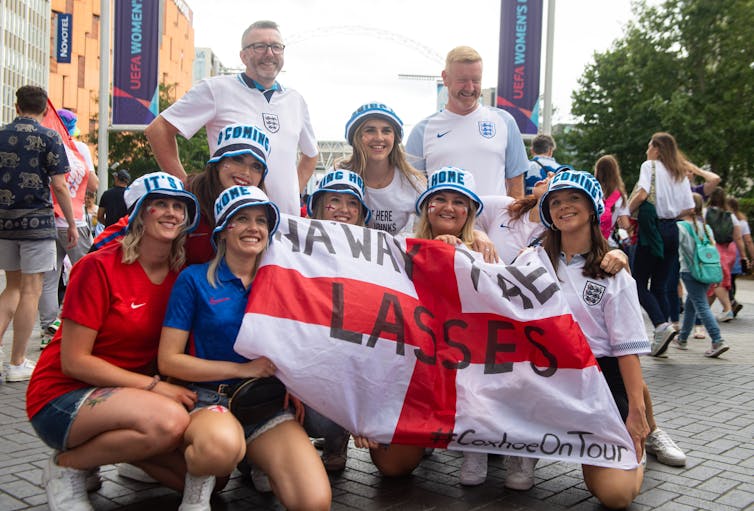
During the 2022 European Championship, The Football Association’s (FA) @England account tweeted about the women’s team 80% less than the dedicated @Lionesses account did. According to my research, the FA appears to be reserving it’s much more widely followed @England account for the men’s team – this questions the FA’s perception of the women’s team and its significance.
In my research, published in May, I undertook a comprehensive analysis of the FA’s use of social media during the England men’s and women’s respective 2020 and 2022 European Championship campaigns.
I found that the FA’s current social media strategy seems to treat the @England account as the default men’s account while mostly promoting the women, albeit significantly, through a smaller, distinct profile. This needs to change if the men’s and women’s national teams are to be promoted equally.
This was the first study to compare coverage of men’s and women’s teams through their own governing body’s social media accounts. I analysed a total of 2,942 tweets posted to the FA’s @England and @Lionesses Twitter accounts during the two tournaments.
Women’s sport has witnessed significant growth in recent decades. But studies have consistently revealed disparities in the portrayal of men and women athletes by traditional media outlets. Social media has provided a way to bypass these traditional media gatekeepers, helping to bridge the gap between men’s and women’s sports.

The positives
But my study found some improvements too. The FA tweeted more frequently from the @Lionesses account during the women’s competition than they did from the @England account during the men’s tournament. This shows a positive advancement in their portrayal of the women’s team and demonstrates a divergence from conventional media practices that restrict coverage of women’s sports and downplays their accomplishments.
The tweets from the @Lionesses account portrayed the team as professional athletes, a departure from the mediated approach that has traditionally reduced women athletes to roles such as girlfriends, wives and mothers. The FA’s improved depiction of the team aligns with their efforts to rectify past missteps. These include their highly criticised tweet following the 2015 World Cup that suggested that following the event, the players would return to roles as mothers, partners and daughters.
These findings reflect a positive shift towards more favourable and extensive coverage of women’s sports in the UK. The FA’s proactive approach during the women’s tournament signifies their awareness of this trend and their commitment to ensuring widespread access to updates and information for those interested in women’s football.
Despite the financial precariousness of women’s football becoming increasingly apparent during the pandemic, throughout a four-week period in July 2022 the Lionesses took centre stage.
My findings underscore the significant impact that sports organisations can have in promoting gender equality through their social media presence. But it also highlights the importance of equality-driven governing bodies ensuring that their social media usage aligns with their values and effectively reflects gender parity.
The FA declined to comment when approached about this story.

Looking for something good? Cut through the noise with a carefully curated selection of the latest releases, live events and exhibitions, straight to your inbox every fortnight, on Fridays. Launches August 4. Sign up here.
Steph Doehler does not work for, consult, own shares in or receive funding from any company or organisation that would benefit from this article, and has disclosed no relevant affiliations beyond their academic appointment.
This article was originally published on The Conversation. Read the original article.







